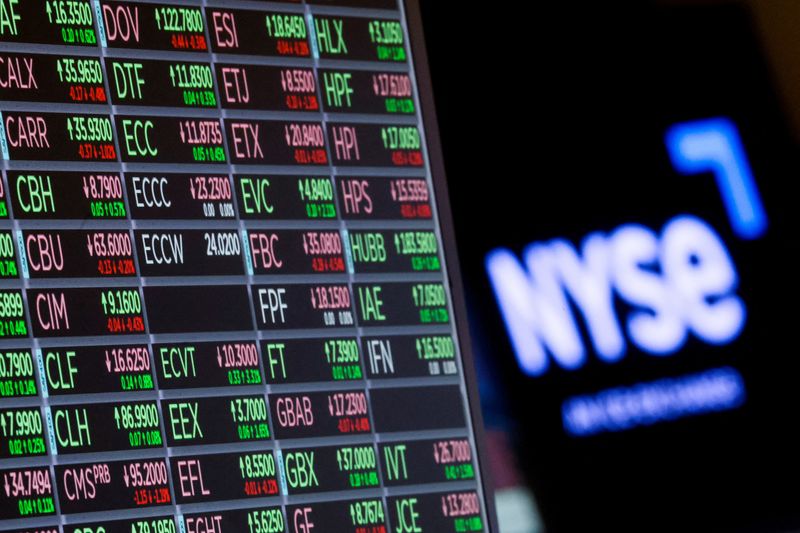By Geoffrey Smith
Investing.com -- Jobless claims and the Challenger Job Cuts report will give the market more to chew on before Friday's all-important jobs report, and there are a couple of Federal Reserve speakers to help people interpret them. China is planning a big stimulus program in the second half of the year. Merck is on the verge of buying cancer specialist Seagen for $40 billion, according to report. Shell signals that high oil and gas prices are back for the foreseeable future, and U.K. Prime Minister Boris Johnson finally throws in the towel. Here's what you need to know in financial markets on Thursday, 7th July.
1. Labor market teasers and Fed speakers
The big warm-up to June’s jobs report continues Thursday, with the release of the monthly Challenger Job Cuts survey and weekly jobless claims numbers due at 7:30 AM ET (1130 GMT) and 8:30 AM ET (1230 GMT) respectively.
The numbers will likely flesh out a picture of a labor market that is still extraordinarily tight by historical comparison, despite signs of cooling in recent weeks. The JOLTS, Job Openings and Labor Turnover Survey, released on Wednesday, still showed nearly 2 vacancies for every unemployed worker in May despite a clear drop from its high earlier this spring.
The availability of other jobs is a big factor in keeping a lid on claims for jobless benefits, which are also still low by historic levels despite their recent pickup. Also of note could be today’s trade data for May, after imports fell for the first time in over a year in April.
The Federal Reserve’s Chris Waller and James Bullard are both due to speak at 1 PM ET, meanwhile.
2. China eyes massive fiscal stimulus, while ECB accounts are set to reflect tightening pressure
China is looking at a $220 billion fiscal stimulus program for its economy in the second half of the year to help it shake off its ongoing real estate crisis and revive consumer demand in an economy hurt by a stop-start sequence of COVID-19 lockdowns, according to Bloomberg.
The program would allow a big rise in debt issuance by local governments, with much of it directed towards infrastructure – a sign that Beijing is still struggling to find new and more effective ways of stimulating growth. Bloomberg said the 1.5 trillion in bond sales being considered would be brought forward from next year’s quota of local debt issuance.
That’s likely to limit the People’s Bank of China’s room to relax monetary policy if confirmed. Monetary policy elsewhere continues to go firmly in the other direction, with Poland’s central bank expected to hike its key rate by 75 basis points later to its highest since 2003.
The accounts of the European Central Bank’s latest meeting are similarly likely to shed light on the pressure to raise rates more quickly.
3. Stocks set to build on Wednesday gains; Merck/Seagen deal in focus
U.S. stock markets are set to build on Wednesday’s tentative gains at the open later, as the latest economic data bolster Fed chair Jerome Powell’s claims that the economy can cope with higher interest rates.
By 6:15 AM ET (1015 GMT), Dow Jones futures were up 71 points or 0.2%, while S&P 500 futures and Nasdaq 100 futures were up in parallel. All three cash indices had added around 0.3% on Wednesday.
Stocks likely to be in focus later include Merck, which The Wall Street Journal reported as being in advanced talks to buy cancer specialist Seagen for around $40 billion. Also in focus will be chipmakers after Samsung (KS:005930) gave Q2 guidance that is solid but nonetheless a little below expectations. GameStop (NYSE:GME) may also draw attention after announcing a four-for-one stock split.
4. Johnson throws in the towel
The pound rose as U.K. Prime Minister Boris Johnson succumbed to the inevitable. According to U.K. media reports, he’ll announce his resignation as Conservative Party leader around lunchtime in London, with the intention of staying on formally as Prime Minister through the summer while his party organizes a leadership contest.
That would imply three months of drift for U.K. assets at a time when the economy is slowing sharply due to a cost of living crisis. On a more positive note, it removes the risk of radical action to make relations with the EU even worse by unilaterally ripping up its Brexit trade agreement.
Bookmakers have installed Rishi Sunak, who resigned as Chancellor of the Exchequer on Tuesday with a heavy hint of frustration at not being able to tighten fiscal policy, as the favorite to succeed Johnson. With their poll ratings collapsing, it’s unclear whether Tory MPs will feel they can afford such hawkishness.
5. Oil edges higher ahead of EIA data; Shell sends bullish signal
Crude oil prices rose but stayed below $100 a barrel – at least in the U.S. – shrugging off American Petroleum Institute data indicating that crude stocks rose for the fourth time in five weeks last week, despite the onset of the July 4th weekend, typically a period of peak demand.
The U.S. government’s data are due at 10:30 AM ET, a day later than usual due to the holiday. Overnight, U.K. oil and gas giant Shell (LON:RDSa) sent a strong signal about the impact of this year’s events on the medium-term outlook for oil and gas prices, reversing up to $4.5 billion of write-downs it had made during the pandemic. That will cushion the balance sheet hit from the Russian government’s expropriation of the Sakhalin-2 gas project.
